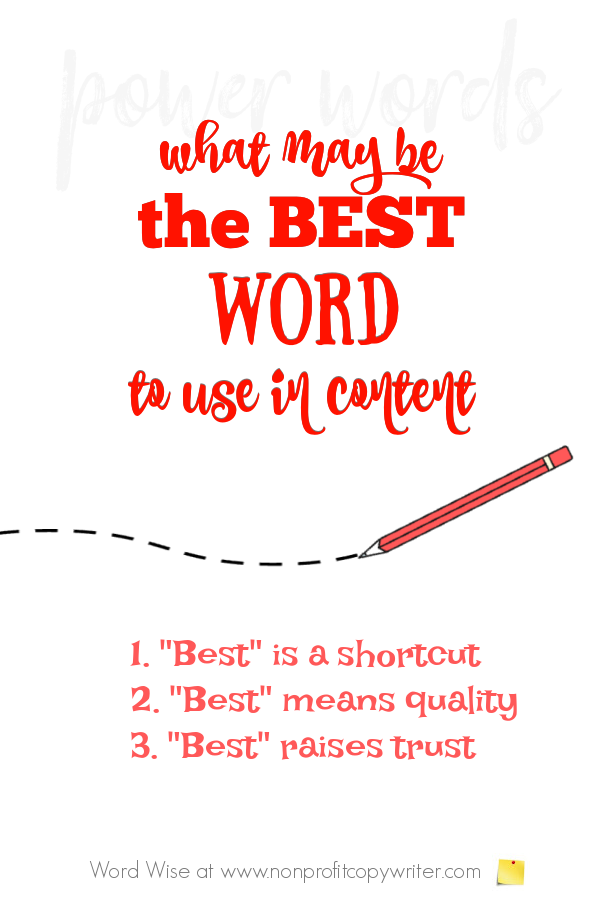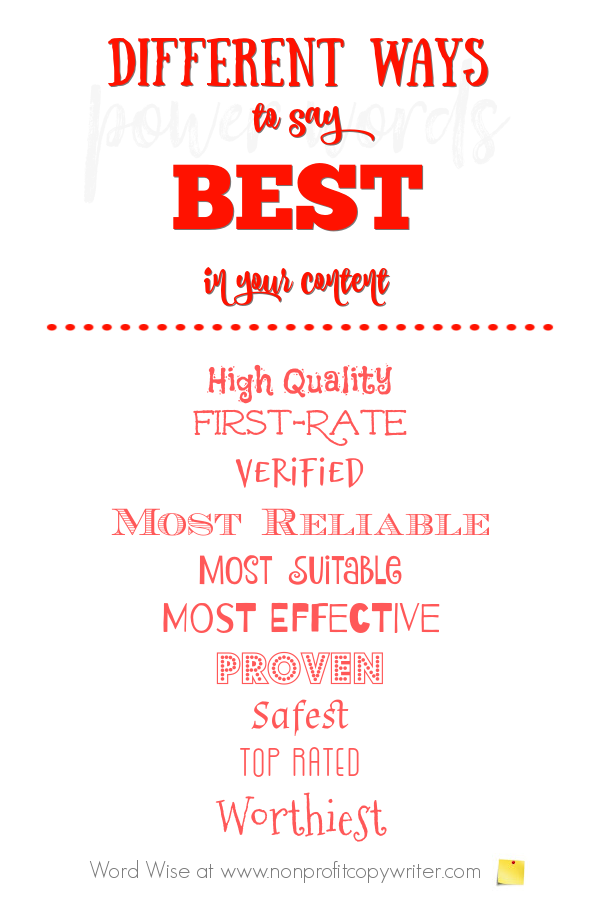Save Time: Get 5 Simple Writing Tips
you can put to use in 10 minutes
This Might Be the Best Word to Use In Content
Award-winning writer Kathy Widenhouse has helped hundreds of nonprofits and writers produce successful content , with 750K+ views for her writing tutorials. She is the author of 9 books. See more of Kathy’s content here.
Posted 3.18.25
For decades, the best word to use in content — one that nearly guaranteed a click — was “free.”
Free means no risk … no effort … plenty of value. Everybody wants that.
So, writers bellied up. The internet was flooded with free offers.
That led to a strange phenomenon. The deluge meant freebies got a reputation for less value, even when they’re high quality. And users grew suspicious of “free” when bad actors included hidden costs and annoying upsells.
Not everyone is guilty of misusing “free,” mind you. “Free” still gets views and clicks. But now, people’s priorities are changing.
There’s been a shift from “free” to “best”
Your second block of text...
Google Trends reveals a shift in what readers look for online.
Until a few years ago, searches for “free” offers dominated, even though the number of those searches trended downward. At the same time, searches for the “best” products or services climbed steadily.
In 2017, the two curves intersected, says SEO guru Neil Patel. “Best” overtook “free” as the more popular search term. And while overuse certainly has played a role, there are other reasons “best” may be the best word to use to engage readers.
Why “best” may be the best word to use in your content
“Best” is a shortcut
You take shortcuts in your commute … in your food prep … your work processes. Why not in your online searches?
That’s what your readers do. A Princeton University study found that when presented with too many choices, people often prefer the option that appears pre-vetted — like one labeled “best.”
Why it works: The brain prefers efficiency, and “best” suggests a quick, reliable decision. When they see “best,” readers feel they’re getting a shortcut to the top choice. It gives readers permission to bypass extra research and get easy relief from decision fatigue.
“Best” means quality
The word “best” automatically creates a comparison, even if no competitors are mentioned. For instance, “The best way to grow tomatoes” makes a stronger impression than “Ways to grow tomatoes.” It implies comparison without listing alternatives or direct evidence.
Why it works: The brain organizes and reorders incoming information using a ranking system. “Best” indicates superiority. Readers see “best,” and the brain fills in the gap, moving that item to first place.
“Best” raises trust
You’re considering a purchase. So you look for “the best pair of running shoes for asphalt” or “the best novels to read at the beach this year” or “the best lawnmower for zoysia grass.” You want guidance from other consumers, surveys, and experts.
Social proof earns trust. Like you, searchers want expert recommendations and endorsed options. That’s why millions of searches contain the word “best” … and why it’s often the best word to use in content.
Why it works: The word “best” suggests to the reader that you’ve evaluated the choices (or you’ve found experts who do so) and you’ve uncovered the optimal solution. You’re ready to stake your name on your evaluation. By taking that risk, you raise trust in your reader.
How “best” is different from other power words
- “Best” is different than “free,” which persuades by offering something at no cost.
- “Best” is different than “you,” which persuades by making content personal.
- “Best” is different than “because,” which persuades by explaining why.
- “Best” is different than “easy,” which persuades through convenience.
“Best” is different from those other power words because it persuades by superiority.
The best word to use in content also has some risk
Using the word “best” in your content and copy can be effective, but it also comes with risks.
Lack of proof
If you claim something is the “best” but don’t offer evidence, your content loses credibility. Plus, Google’s algorithms favor genuinely helpful content rather than just keyword-stuffed. If your “best” content isn’t backed by valuable insights or expertise, it may not rank well. Worse yet, if you claim your product or service is the “best” without objective proof, it could lead to legal issues or complaints of false advertising.
Solution: Back up your “best” claims with data, testimonials, comparisons, or expert opinions.
Overuse
Readers have seen “best” too many times. It’s an easy target for skeptics and those who raise objections. If your “best” exaggerates, readers ignore or distrust it.
Solution: Use specific, benefit-driven language — perhaps even alternatives to “best.” Instead of “Best Email Marketing Tool,” try “The Email Marketing Tool That Tripled Our Open Rates.” And try to incorporate “you” where possible to make your content less general and more personalized. Instead of “Best Ways to Grow Tomatoes,” try “The Best Ways You Can Grow Juicy, Flavorful Tomatoes.”
When should you use “best”?
“Best” is persuasive. And it’s SEO-friendly because it attracts users who are ready to act and don’t want to wade through piles of content. Titles with “best” jettison to the top of search results … provided the content proves itself.
Which is why it’s best to use “best” strategically.
- Offer proof for “best” with facts, statistics, testimonials, comparisons, and expert evidence.
- Consider alternatives like, “most effective,” “top-rated,” and “proven.” This way, you’ll reserve “best” as true persuasive capital used selectively.
- Make sure “best” is worth a premium and truly lives up to its claim. Likewise, if you offer a freebie, ensure that it’s high quality (worth actual money) to elevate paid offerings as your “best.”
Readers have grown wary of “free.” They’re apt to trust “best.”
Don’t misuse that trust. If you proclaim what’s “best” — well, let’s just say it better be.
More Power Words that Persuade
The 7 Most Powerful Words in Persuasive Content...
The Power of Free: It Can Be Priceless For Your Content …
The Power of "Because": persuade by explaining why ...
The Power of "New: It's not a gimmick - it's science ...
Want to Persuade? Use the World’s Most Powerful Word ...
10 Buzz Words with Staying Power ...
It’s "Easy"! One Word That Makes Writing Powerful Key Phrases Simple...
See more Power Words on our Pinterest board...
Return from The Best Word to Use In Content to Nonprofit Copywriter home
As an Amazon Associate I earn from qualifying purchases.
Share This Page

Named to 2022 Writer's Digest list
BEST GENRE/NICHE WRITING WEBSITE


Stop Wasting Time!
Grab your exclusive FREE guide, "5 Simple Writing Tips You Can Put to Use in 10 Minutes or Less"













